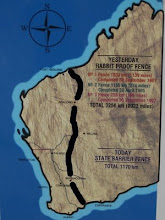
Finding Ullagundahi Island by Fabienne Bayet-Charlton
‘We've all wanted to know for years where we really come from. We all want to know why, after being born in New South Wales. We have ended up in the middle of Australia, the desert, Coober Pedy' (Bayet-Charlton 2002, p.12)
‘Softly, quietly so as not to wake old feelings, and mabye old spirits, Nana speaks about her life, about her family, her childhood, before the desert. She talks of her home, the strength of her childhood. She tells me about a river so wide, blue and meandering that her people lived in the middle of it, and trees so dense in numbers, so thick with leaves, they created a canopy of green mist throughout the land’ (Bayet-Charlton 2002, p.13)
‘Within the largest collection of Aboriginal-related material in the southern hemisphere, no, in the world, I am marooned. The white anthropologist who collected the material of my family, of my ancestors, has greater right of access than I do. It is his work. It is his information. I am dispossessed of it. Another gate has been locked. I wonder how many other people have come into this great institute, this wonderful cornucopia of information, and gone away empty-handed’ (Bayet-Charlton 2002, p.157)
These quotes sum up the purpose of this novel, a young girls quest to find the home of her family, to discover her ancestry, and to find this island that her Nana described in such detail and the places that she has heard about. They provide examples of the emotive and expressive language used to convey to the reader the true feelings of the character, and the passion that Bayet-Charlton has for the novel. This novel is written in such a way as it is a memoir of events, and the author acknowledges it to be of real events and characters in her life, but that it is also a mix of fiction/narrative.
There are many themes in this story, from homecoming, to a look at the settlement and its impact on the Indigenous culture. There is a sense of looking for belonging and purpose and a journey to discover ones roots and heritage, and ones identity. This novel touches on the subject of the Indigenous culture being lost in the past or distorted by individuals not passing on their stories and knowledge and the impact of institutions documenting and recording very little on Indigenous Australians at that time. The quote from page 157 (above) describes the frustration that she feels when she is turned down, again, in finding information regarding her family history. It shows how institutional or scientific accounts of Indigenous history have been buried and submerged, and even distorted by these institutions and how Indigenous Australians feel out of place and lost through not having the opportunity to find out more about their past.
Bayet-Charlton’s writing style incorporates evocation, imagery, metaphors, connotation, and juxtaposition to create a memoir/narrative that conveys such meaning, and emotion through to the reader, so we feel like we are part of the story, that we are right there facing the same injustices’ that the character faces, the prejudice from colleges and the uncertainty of the journey she goes on. The story takes an emotional rollercoaster and incorporates ‘flashbacks’ to what she remembers from her past to stories she remembers being told. Bayet-Charlton’s novel represents a ‘journey’ into the past, to her families’ ancestral place and how her parents and grandparents experiences impact upon her own identity and who she is as an Indigenous Australian. Throughout the whole story however she is compelled to continue her search to because of her Nana, and her Nana’s memories pushing her to keep going, so that she can go back to see her Nana and tell her that she found it, that she found her home, her past, and her history.
This story moved me and I found myself understanding why some Indigenous Australians are angry with the government for removing them from their land, their family and for placing them into the care of white civilisation, stripping them of their identity and their culture, leading to the uncertainty and loss of identity that many Indigenous Australians face today. I imagine what it would be like for me to be searching for my past, my heritage and the frustration I would feel at the roadblocks in my way to learning about myself, my family and home. I would feel lost, angry, confused and locked out of my past.
This is essentially what this novel is about, family, homecoming and heritage.
Bayet-Charlton, F (2002), Finding Ullagundahi Island, Crows Nest, New South Wales: Allen & Unwin.


No comments:
Post a Comment